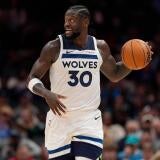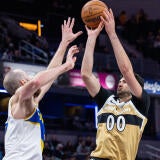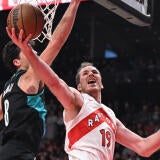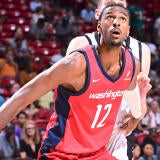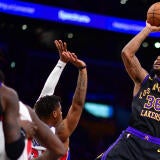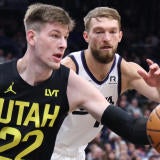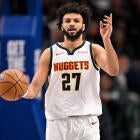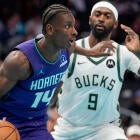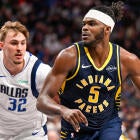Fantasy Basketball: Gordon Hayward to Celtics leaves plenty of dominoes left to fall
Gordon Hayward's value doesn't change much, but his decision to join the Celtics could have huge ramifications around the league. Chris Towers tries to look ahead at what could be next.

Some NBA moves have a huge impact on the Fantasy world on their own. Paul George getting traded to the Thunder is one such move; it brought two top-15 Fantasy options together, and left another team utterly devoid of options. That wasn't a move where the surrounding context needs to get much publicity.
Gordon Hayward's decision, announced Tuesday, to join the Celtics is the other kind of move. Hayward is a terrific player in his own right, finishing last season as the No. 33 overall player in Rotisserie scoring leagues, and well worth the max deal Boston will pay him.
However, what is most interesting about this move from our perspective isn't necessarily Hayward's decision, but what will flow from it. The Celtics have some moves to make to fit Hayward in, and the Jazz have not one but two starters to replace following a breakout season. Let's try to figure out what it means for Hayward, the Celtics and the Jazz.
What does it mean for Hayward?
This should be the shortest section because there's not going to be much of a change here for Hayward. He's the kind of star player who should fit in pretty much anywhere. Need him to be your go-to scorer? Coming off a three-year stretch that has seen him average 20.3 points with a .574 True Shooting percentage, Hayward is certainly well suited for that role. He's capable of creating for himself, adept both at shooting from the outside or getting to the rim.
However, if you need him to slide into a different role, he's capable of that too. Hayward's playmaking declined in 2016-17 playing next to George Hill, and we shouldn't expect that number to recover next to Isaiah Thomas. However, he did average 5.2 assists per game in 2013-14, so he's more than capable of handling play-making duties if needed. And, as his 39.8 percent mark on 3-pointers last season shows, he's not someone you can just ignore when he's off the ball; he made 38.5 percent of his catch-and-shoot 3-pointers, per NBA.com/stats, as well.
In short, don't expect much to change for Hayward. Sure, he's playing next to a more ball-dominant point guard in Thomas, but whatever he loses in touches can likely be made up for in pace. The Celtics ranked 12th in pace last season, while the Jazz were dead last in the NBA. Expect more of the same, making him a worthwhile selection around the turn from the third to the fourth round.
What does it mean for the Celtics?
The Celtics have kept their powder drier than pretty much anyone else in the league, content to watch stars get moved elsewhere on the trade market if teams didn't meet their demands. This has led to plenty of teeth gnashing among those who follow the league, of course, but it's hard to complain about the results for a team built around three All-Star caliber players in Hayward, Thomas, and Al Horford, a bevy of cheap role players on the right side of 30 and a (frankly, ridiculous) collection of future trade chips. The future is bright in Boston, and it's brighter still in light of Hayward's move East.
However, there is one catch here. That is, they haven't actually signed Hayward and don't yet have the cap space to do so. This is more a formality than anything, but the Celtics do need to make some moves to clear up the space to actually lock Hayward in. That will likely require the team move one of Marcus Smart, Avery Bradley or Jae Crowder.
Crowder and Bradley are, at this point in their careers, pretty established. They are terrific role players, and useful Fantasy options, to be sure, but they don't have much upside. You'll draft them in the middle rounds, set them in your lineup in Week 1, and forget about them
Smart, on the other hand, has so much more potential. That's not to say he's better than either Bradley or Crowder, because he's not. But if Fantasy players got to pick who gets moved, he's the obvious call. Playing time hasn't been hard to come by in Boston, as he averaged 30.4 mpg last season, but the Celtics have rightly been a bit reticent to let Smart do too much. He's an erratic offensive player, capable of moments of brilliance – witness his massive 27-point, seven-assist performance in Game 3 against the Cavs last season – but more often, he leaves you shaking your head with his offensive incompetence (see his 14 combined points on three made field goals in the next two games against Cleveland).
For a team like Boston, so stocked with strong playmakers already, reigning in Smart made all of the sense in the world. However, if they can find a team to take him on, let's hope it is one that will let Smart be Smart. The results might not be pretty, but there is at least a chance he takes a leap to stardom, and that's what Fantasy players want to see – a chance.
What does it mean for the Jazz?
The Jazz are going to have to retool on the fly, and did a good job in acquiring Ricky Rubio for almost nothing at the end of June. With Rudy Gobert around and on the short list of best centers in the game, this won't be a rebuild, but Hayward was the star the offense orbited around, and with him and George Hill both gone, things are going to look a lot different in Utah this season.
Rubio is a good start, but his limitations are well defined, and fitting him seamlessly into an offense featuring Gobert could lead to some awkward moments when defenses crowd the paint. The keys to making this work are going to come from elsewhere on the roster, and one name in particular stands out -- Rodney Hood.
Last season was supposed to be Hood's breakout, but it didn't really happen for him. The addition of Hill left Hood as the third ballhandler on most nights, and a lingering knee injury also limited him to just 59 games. Hood averaged 12.7 points, 3.4 rebounds and 1.6 assists per game, in what was a disappointing campaign all around.
However, there is still plenty of talent here. Hood was a bit redundant with Hayward around, but he is more than capable of filling that secondary ballhandler role Hayward had, and has the potential to improve even on his career-best 37.1 percent 3-point mark from last season. There is a ton of talent here, and with Hayward gone, a ton of opportunity.
Hood let you down last season, and 2017-18 is going to be a career-defining season for him one way or the other. He is eligible for an extension this summer, but it makes a lot more sense for both he and the Jazz to let it go to restricted free agency next summer. He'll have a lot to play for this season as a result, and a big breakout could get him paid. There is upside here for Hood to replace what Hayward did last season, and he'll be worth targeting in the seventh round on Draft Day, as a post-hype breakout candidate.







